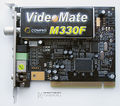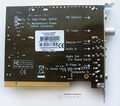Compro VideoMate M330F: Difference between revisions
No edit summary |
No edit summary |
||
| Line 15: | Line 15: | ||
<gallery perrow=5> |
<gallery perrow=5> |
||
image:compro_m330f_hw_1.jpg |
image:compro_m330f_hw_1.jpg |
||
</gallery> |
|||
The advantages include support SAA7134HL all analog broadcasting standards, quality decoding PAL / SECAM, the presence of video and stereo decoders A2/NICAM, the possibility of digitizing sound, comfortable for operating modes and an integrated PCI-bridge, which significantly facilitates the creation on the basis of this inexpensive chip PCI-functional devices. |
|||
Of course, more advanced chipsets for TV tuners from the same may please NXP Semiconductors additional advantages, for example, suggest an increased bit depth processing, image a bit more contrast and improved image detail. However, the cost of new products is not really a mass to their use, especially in budgetary decisions. |
|||
<gallery perrow=5> |
|||
image:compro_m330f_card2_1.jpg |
|||
</gallery> |
</gallery> |
||
Revision as of 10:36, 20 February 2014
An Analog TV PCI card from Compro Technology.
Compro VideoMate M330F model is a "classic". A full-length PCI-board, using the traditional "cupping" RF unit. About ten years ago it was such an overwhelming majority of computer TV tuners. Today, when all manufacturers are mostly passed on semiconductor RF blocks, to meet such an instance - is a rarity.
In this case, the model of the RF-unit TVision TVF98T5-B/DFF from some probably Taiwanese company Young Mountain Electronics Co . Made it carefully, both outside and inside. Let's hope that it will show in the work itself is not worse.
Compro VideoMate M330F basis is 9-bit chip SAA7134HL , also became during its existence already classics. Now it is produced by NXP Semiconductors , Which is a division of Philips. I must say that, despite the proliferation of more advanced chips SAA713x family and still actively used by individual manufacturers.
The advantages include support SAA7134HL all analog broadcasting standards, quality decoding PAL / SECAM, the presence of video and stereo decoders A2/NICAM, the possibility of digitizing sound, comfortable for operating modes and an integrated PCI-bridge, which significantly facilitates the creation on the basis of this inexpensive chip PCI-functional devices.
Of course, more advanced chipsets for TV tuners from the same may please NXP Semiconductors additional advantages, for example, suggest an increased bit depth processing, image a bit more contrast and improved image detail. However, the cost of new products is not really a mass to their use, especially in budgetary decisions.
Overview/Features
Hardware
- Analog TV and FM can tuner design
- Support PAL/SECAM BG+DK, DK+I, or NTSC system
- Advanced NXP(Philips) SAA713x 9-bit ADC chip with TV stereo (SAP/NICAM/A2/EIAJ) support
- IR remote control
- Card dimensions: 120 x 100 mm
Connectors
- TV input (F or PH type)
- FM input (PH type)
- S-Video input (Mini-DIN 4 pins, Black)
- Composite input (RCA Jack, Yellow)
- IR sensor input
- Audio input (Phone Jack, 3.5mm, Black)
- Audio output (Phone Jack, 3.5mm, Green)
Other Images
Identification
# lspci -vvvnn
02:01.0 Multimedia controller [0480]: Philips Semiconductors SAA7134/SAA7135HL Video Broadcast Decoder [1131:7134] (rev 01)
Subsystem: Compro Technology, Inc. Compro VideoMate Gold+ Pal [185b:c200]
Control: I/O- Mem+ BusMaster+ SpecCycle- MemWINV- VGASnoop- ParErr- Stepping- SERR- FastB2B- DisINTx-
Status: Cap+ 66MHz- UDF- FastB2B+ ParErr- DEVSEL=medium >TAbort- <TAbort- <MAbort- >SERR- <PERR- INTx-
Latency: 32 (63750ns min, 63750ns max)
Interrupt: pin A routed to IRQ 22
Region 0: Memory at ff1ffc00 (32-bit, non-prefetchable) [size=1K]
Capabilities: [40] Power Management version 1
Flags: PMEClk- DSI- D1+ D2+ AuxCurrent=0mA PME(D0-,D1-,D2-,D3hot-,D3cold-)
Status: D0 NoSoftRst- PME-Enable- DSel=0 DScale=3 PME-
Kernel driver in use: saa7134
Remote Control
External Links
- Product page at manufacturer website.





